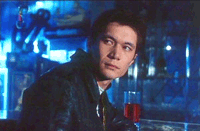An early episode in Killer shows a highly distinguished and mild-mannered research director of the Institute of Mathematics named Professor Kassymov hopelessly lost in the labyrinth of a broadcasting station office building, unable to find the main exit after completing a taped guest interview for a radio program entitled In Your Own Time. The understatedly humorous episode proves to be a subtle reflection on the uncertainty of life and seemingly inescapable economic recession in post-Soviet era Kazakhstan as well, an atmosphere that is reinforced by the film’s opening sequence of a slow motion, monochromatic shot of dour, window shopping patrons navigating through the narrow, crowded pedestrian alley of an open market on a brisk winter day. Professor Kassymov’s chauffeur, Marat (Talgat Assetov), having driven his employer back to the institute, has been given the afternoon off and use of the staff vehicle in order to transport his wife, Aijan (Roksana Abouova) and newborn son home from the hospital. However, the happy occasion would soon turn somber when Marat attempts to catch a glimpse of his son while deciding on an appropriate name for the infant and inadvertently causes a collision with a car that has stopped for a red light at an intersection. Unable to cover the expenses for the repair of the two automobiles, Marat decides to pay a visit to his older sister Saoule in order to seek financial advice, but is derailed from his intent when he walks into a marital squabble stemming from his brother-in-law, Serik’s realization that Saoule has been swindled of the family savings in an investment trust scheme by a group of disreputable businessmen. Returning home, Marat discovers that the aggrieved motorist has dropped by unannounced, accompanied by two hired thugs. Subjected to intimidation and physical violence, Marat is compelled to borrow money from a ruthless mobster in order to pay for the repairs, and is unwittingly inducted into the corruption of a flourishing underworld in the nascent free market economy of Kazakhstan.
Darezhan Omirbaev presents a spare and muted, yet compelling and incisive account of despair, rootlessness, materialism, and amorality in Killer. Omirbaev uses subtly modulated recurring imagery in order create an environment of circularity and entrapment that reflect Marat’s existential dilemma which, in turn, provides a broader commentary on the spiritual and moral crisis resulting from the country’s economic turmoil following the collapse of the Soviet Union: the rearview mirror shots reflecting an impassive Marat, his repeated visits to a tawdry bar in order to establish contact with the mobster, the decorative bird mobile in the bar that is repeated in the image of birds in sudden flight near an aqueduct, the inferred acts of violence that occur off-camera. Note Marat’s two dream sequences on the roof of a building (both of which occur after he is physically assaulted): the first, across from a construction site (that alludes to the nation’s economic rebuilding) as he steps onto the ledge, the second, overlooking a busy public square where he awakens before the fall. In the end, what emerges is an innately disturbing portrait that juxtaposes a desire to transcend with the more conventional image of a figurative self-destruction (and perhaps, even murder), a reflection of a lost humanity that has become disconnected from its moral center in a suicidal and nihilistic struggle for economic survival.
© Acquarello 2003. All rights reserved.
